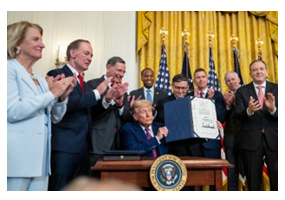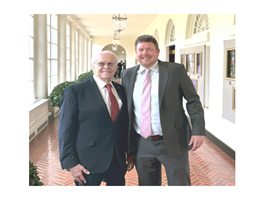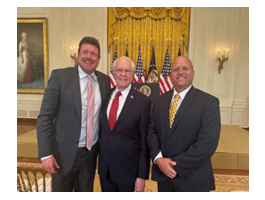Energy Marketers of America Weekly Review - June 13, 2025
Energy Marketers of America Weekly Review - June 13, 2025

President Trump Signs CRA Overturning the “California Car” Mandate
EMA Attends White House Bill Signing Ceremony
 Yesterday, President Donald J. Trump signed into law the Congressional Review Act (CRA) resolutions to overturn Biden-era rules granting Clean Air Act waivers to California. The Energy Marketers of America (EMA) was honored to attend the White House bill signing ceremony — marking a major victory for the auto and fuel industries, as well as for small businesses and working families across the country.The CRA resolutions nullify three sweeping California mandates: (1) the Advanced Clean Cars II (ACC II) rule, which attempted to ban internal combustion engine vehicles by 2035; (2) the Advanced Clean Trucks rule; and (3) California’s heavy-duty NOx emissions standards.
Yesterday, President Donald J. Trump signed into law the Congressional Review Act (CRA) resolutions to overturn Biden-era rules granting Clean Air Act waivers to California. The Energy Marketers of America (EMA) was honored to attend the White House bill signing ceremony — marking a major victory for the auto and fuel industries, as well as for small businesses and working families across the country.The CRA resolutions nullify three sweeping California mandates: (1) the Advanced Clean Cars II (ACC II) rule, which attempted to ban internal combustion engine vehicles by 2035; (2) the Advanced Clean Trucks rule; and (3) California’s heavy-duty NOx emissions standards.
California’s ACC II rule would have required vehicle manufacturers to sell an increasing share of zero-emission vehicles (ZEVs) starting in model year 2026, culminating in a full ban on internal combustion engine vehicle sales by 2035. Seventeen states had already adopted portions of these California regulations, threatening to upend national transportation markets. These policies—enabled by EPA-issued waivers—would have sharply reduced the availability of liquid fuels, raised transportation and goods costs, and disproportionately harmed small business energy marketers and working families.
 “EMA applauds the bipartisan work in Congress to rein in California’s regulatory overreach and protect consumer choice and fuel diversity,” said EMA President Rob Underwood. “Today’s bill signing makes clear: liquid fuels are essential to America’s energy future. We thank President Trump for his leadership and for standing up for small businesses, energy independence, and the millions of Americans who rely on affordable transportation options.”Although the CRA now officially overturns EPA’s waiver approvals, California Attorney General Rob Bonta said the State intends to pursue a legal challenge. Governor Gavin Newsom also denounced the action, claiming it undermines California’s climate agenda.
“EMA applauds the bipartisan work in Congress to rein in California’s regulatory overreach and protect consumer choice and fuel diversity,” said EMA President Rob Underwood. “Today’s bill signing makes clear: liquid fuels are essential to America’s energy future. We thank President Trump for his leadership and for standing up for small businesses, energy independence, and the millions of Americans who rely on affordable transportation options.”Although the CRA now officially overturns EPA’s waiver approvals, California Attorney General Rob Bonta said the State intends to pursue a legal challenge. Governor Gavin Newsom also denounced the action, claiming it undermines California’s climate agenda.
EMA remains committed to advocating for a diverse and affordable energy mix—and will continue to defend the rights of consumers and small businesses against harmful one-size-fits-all mandates.

House Lawmakers Urge FMCSA to Adopt Preemptive and Proactive Hours of Service Regulatory Policy
This week, Congressman Bost (R-IL) and Congressman Mike Collins (R-GA), along with 31 House lawmakers, formally requested that the Federal Motor Carrier Safety Administration (FMCSA) implement a preemptive and proactive policy for hours of service (HOS) exemptions to enhance disaster preparedness and recovery efforts. The request, detailed in a letter to FMCSA Executive Director and Chief Safety Officer Lawless emphasizes the urgent need for timely and predictable regulatory relief to ensure the uninterrupted flow of essential services and supplies, such as liquid fuels, during major disasters and regional emergencies.
“When communities are staring down the threat of a dangerous emergency, the last thing they should have to worry about is ready access to fuel for their homes and vehicles,” said Bost. “I grew up in a family trucking business; I know red tape and delays at the federal level often make it harder for truckers to do their jobs and deliver their product when it matters most. This commonsense policy change will help keep families safe and spur a quicker recovery during severe weather and supply chain disruptions.”
With the increasing frequency and severity of natural disasters and emergencies, House lawmakers highlighted the critical role of liquid fuel marketers in maintaining fuel supply chains for fueling stations and home heating, particularly during life-threatening events.
“When disaster strikes, our fueling stations need to be supplied and ready to provide first responders and everyone in the impacted zone with the power they need to recover and rebuild,” said Rep. Mike Collins. “I am proud to join my colleagues in improving disaster response and getting government bureaucracy out of the way of common-sense solutions.”
The letter proposed two key actions for the FMCSA:
- Preemptive Emergency Declarations: Develop internal guidance to issue federal emergency declarations and trigger automatic HOS relief at least five days before reliably predicted disasters. This proactive approach would support advanced preparation, enabling fuel marketers to maintain adequate supplies for evacuations and mitigate potential shortages during severe weather events.
- Uniform Regional Relief Policy: Implement a standardized federal policy for regional HOS exemptions to promote consistency and clarity. The current reliance on state-level declarations often results in a fragmented regulatory landscape, causing confusion and delays for multi-state fuel suppliers. A uniform federal approach would streamline compliance and enhance the efficiency of fuel distribution across state lines.
The letter underscores the FMCSA’s authority to issue emergency declarations and urges the adoption of clear internal guidance to facilitate proactive regional relief. This policy would eliminate compliance challenges and enable drivers to make optimal routing decisions for swift restoration of essential fuel supplies. “Over 300 energy marketers across the country attended the Energy Marketers of America’s DC Conference and Day on the Hill last month and made it a priority to get lawmakers to call on the FMCSA to establish a forward-thinking policy that ensures timely and consistent HOS relief during emergencies,” said EMA President Rob Underwood. “We stand ready to collaborate with the agency to develop this critical framework for disaster response and recovery.”
EPA Proposes RFS Volumes for 2026 and 2027
EPA issued proposed RFS annual blending mandates today which would require 24.02 billion Renewable Identification Numbers (RINs) in 2026, and 24.46 billion RINs in 2027. These proposed levels are nearly 8 percent more than the 2025 level but are less than the volumes sought by some refiners and the ag community. Corn-based ethanol renewable fuel volumes would be set at 15 billion gallons for both 2026 and 2027. Also, the EPA would partially waive the 2025 mandate for cellulosic biofuel. Embedded in EPA's proposal is setting the biomass-based diesel obligation at 5.61 billion gallons in 2026 and 5.86 billion gallons for 2027.
EPA's proposal also advances other changes to the RFS program intended to increase US biofuels production and deter imports, including reducing the number of RINs generated for imported renewable fuel and renewable fuel produced from foreign feedstocks and removing renewable electricity as a qualifying renewable fuel under the RFS program (eRINs).
EMA supports the Agency’s repeal of the eRIN proposal which would have allowed automakers to generate eRINs based on the EVs they sell by establishing contracts with parties that produce electricity from qualifying biogas. EMA argued during the Biden Administration that the EPA lacked the authority to implement the proposed eRIN credit for renewable electricity because it is inconsistent with the statutory purpose of the RFS, which is to support the production of renewable fuels, not the production and sale of certain vehicle technologies that eRINS are designed to promote.
EMA has for many years called for lower annual corn ethanol blending volumes that would allow marketers to determine for themselves whether to sell E15 rather than be required to do so through a de facto mandate. EMA fully believes in renewable fuels and their importance in the liquid fuels market and plans to ask the Trump Administration to ensure that future federal grant funds be available for small business energy marketers to upgrade their underground storage tank system equipment to safely and legally sell E10 plus blends. “To point out the facts of infrastructure compatibility issues is not being anti-ethanol. To the contrary, we must ensure that ethanol continues to be sold in a safe and legal manner for it to have a promising future,” said EMA President Rob Underwood.
Proposed Volume Requirements (billion RINs)a | 2025 | 2026 | 2027 |
Cellulosic biofuel | 1.19 | 1.30 | 1.36 |
Biomass-based diesel | n/a | 7.12 | 7.50 |
Advanced biofuel | n/a | 9.02 | 9.46 |
Renewable fuel | n/a | 24.02 | 24.46 |
EPA's proposal does not address Small Refinery Exemptions (SREs) from the volume quotas or how the Agency might handle any waived volumes which could impact overall volume requirements. EMA adopted an official policy of neutrality relating to SREs. However, EMA opposes any reallocation of displaced gasoline/diesel volumes lost to SREs. Reallocating displaced volumes that create more ethanol blended gasoline than the marketplace demands increases the cost of RINs and by extension retail prices. If RINs become too costly or insufficient in number to offset higher ethanol RVOs, obligated parties will have no choice but to force E15 on downstream consumers and into billions of dollars-worth of noncompatible gasoline storage and dispensing infrastructure that cannot handle it.
EPA will hold a virtual public hearing on July 8, 2025, for the proposed rule with comments due on August 8, 2025.
This week, Senate Republicans continue to weigh tweaks to the House-passed reconciliation measure - One Big Beautiful Bill Act (H.R. 1). Senate Republican leadership is committed to passing the multi-trillion-dollar bill on the Senate floor by July 4. On Wednesday, Senate Finance Committee Chairman Mike Crapo (R-ID) outlined the Finance Committee’s tax proposals to Republican Senators, which included changes to House-passed provisions on the state and local tax (SALT) deduction cap and proposed rollbacks of Inflation Reduction Act (IRA) clean energy tax credits. While key details on several counterproposals remain unannounced, the Senate Finance Committee is expected to publicly release text of its legislative proposals – which will account for the bulk of the Senate package – as early as today.
Senate Republicans are expected to break from the House on several tax proposals:
- Inflation Reduction Act Amendments: Chairman Crapo told Senate Republicans on Wednesday that the Finance Committee would propose less stringent phase-outs for several IRA clean energy tax credits compared to the House-passed bill, including varying phase-outs based on energy type. The Senate may also include counterproposals on foreign entity of concern (FEOC) requirements for IRA credits and transferability limits.
- State & Local Tax (SALT) Deduction Cap: The Senate is widely expected to scale back House Republican’s proposed increase to the cap on the state and local tax (SALT) deduction. The House proposed to increase the cap to $40,000 (compared to $10,000 under current law) for households with a modified adjusted gross income (MAGI) up to $500,000.
- Business Provisions: Senate Majority Leader John Thune (R-SD) has pledged to make permanent several business-related provisions extended through 2029 in the House-passed bill, including 100 percent bonus depreciation and immediate expensing of domestic research and development (R&D) expenditures.
- Retaliatory Taxes: Several Senate Republicans have suggested the Senate would soften or delay the House’s proposal to impose new retaliatory US tax increases against countries with certain “unfair foreign taxes,” known as Section 899.
What’s Next? The Senate Finance Committee is expected to release text of its legislative proposals as soon as Friday, however, public release may be delayed to next week as Senate Republicans continue to resolve lingering issues. Additional changes to the Senate Finance Committee text may also occur prior to Senate floor consideration of the bill. Further Byrd Rule challenges to Republican proposals by Senate Democrats are also likely following release of the text.
Leader Thune is likely to initiate Senate floor consideration of H.R. 1 in the coming weeks. Upon bringing the bill to the Senate floor, the Senate will begin an amendment process known as a “Vote-a-Rama,” where the Senate will likely consider several hundred amendments to the bill. Following the amendment process, the Senate will vote on final passage which only requires a simple majority under reconciliation rules. Should the Senate successfully pass their version of H.R. 1, Republican leaders will be forced to reconcile differences between the House- and Senate-passed versions of the reconciliation package, either through a formal conference process, through informal negotiations, or by accepting amendments from the other chamber.
FMCSA and PHMSA Propose Rules to Provide Relief to Energy Transportation
The DOT has announced multiple regulatory initiatives aimed at reducing burdens on the energy and transportation sectors. These actions, issued by the FMCSA and the PHMSA, align with the Administration’s broader deregulatory agenda under Executive Orders on “Unleashing American Energy” and “Unleashing Prosperity through Deregulation.”
FMCSA Proposed Rule Changes for Motor Carriers
FMCSA has proposed 18 rules to streamline compliance for commercial drivers and motor carriers. There will be a 60-day public comment period.
Key proposals for EMA marketers include:
- Elimination of CDL Self-Reporting Requirement
CDL holders would no longer need to self-report motor vehicle violations to state agencies. This requirement is now redundant due to the nationwide electronic violation reporting system implemented in 2024. - Revision of Roadside Inspection Return Process
FMCSA proposes to eliminate the requirement for motor carriers and intermodal equipment providers to sign, and return completed roadside inspection reports, citing lack of review and inconsistent state practices. - Removal of ELD User Manual Requirement
The rule would rescind the requirement that drivers carry a hard copy of the electronic logging device (ELD) manual in the vehicle, recognizing the burden without a corresponding safety benefit.
These proposals reflect FMCSA’s shift toward efficiency and targeted enforcement and could result in meaningful cost savings and paperwork reductions for EMA members. EMA will support these initiatives but continue to advocate for further strategic reform, such as a streamlined Hours of Service waiver process and a more practical Hazmat knowledge test.
PHMSA on Hazmat Deregulation
PHMSA is seeking public input on potential revisions to the Hazardous Materials Regulations (HMR) that may no longer provide a justifiable safety benefit or impose undue burden on the energy sector. Key focus areas for stakeholder input include repealing or amending outdated or redundant Hazmat requirements and codifying longstanding special permits with proven safety records.
PHMSA’s objective is to identify regulatory provisions that can be updated or rescinded to reduce compliance costs, improve government efficiency, and support domestic energy logistics. EMA will continue to push for placarding flexibilities.
“EMA will submit formal comments to both FMCSA and PHMSA to ensure the voice of fuel marketers is reflected in federal deregulatory efforts,” said EMA Vice President Sherri Stone.
DOT Will Exclude EVs from the CAFE Standard Setting Process
The DOT’s National Highway Traffic Safety Administration (NHTSA) has issued an interpretive rule that redefines how federal fuel economy standards should be set, signaling a major policy shift under the Trump administration. Specifically, the Agency’s interpretation of the Energy Policy and Conservation Act and the Energy Independence and Security Act makes clear that electric vehicles (EVs) cannot factor into the standard-setting process for fuel efficiency for internal-combustion engine (ICE) cars. NHTSA, thus, will no longer consider EVs when evaluating whether fuel economy standards are achievable, instead focusing on ICE technology.
NHTSA argues that including EVs in fuel economy feasibility calculations runs afoul of longstanding federal law. The Agency interprets these statutes as requiring standards to reflect what is “technologically feasible” and “economically practicable” based on widespread, accessible vehicle technologies—not those bolstered by government incentives or policy preference.
This interpretative rule does not repeal the Biden administration’s fuel economy standards, which would require a full notice-and-comment rulemaking. Instead, it tees up the redo of the regulations. This rule is also at the center of ongoing litigation in which EMA is participating as a “friend of the court.” That litigation could be moot now that NHTSA agrees that federal statutes prohibit it from using EVs in setting the CAFE standard.
Key Takeaways for EMA Members:
- No Immediate Changes to Current Standards: The rule does not revise existing fuel economy targets but lays the groundwork for future rulemakings aligned with this legal interpretation.
- Forthcoming Rulemaking: NHTSA is working on forthcoming CAFE standards that will go through a full rulemaking process, including public comment, based on this legal position.
- Litigation on the Horizon: Legal challenges are expected. Courts may ultimately weigh in on whether NHTSA’s interpretation aligns with congressional intent and the limits of agency discretion under federal energy statutes.
“This is an important first step toward addressing the former administration’s efforts to electrify fleets without clear statutory authority,” said EMA President Rob Underwood. “We will continue to advocate before NHTSA to rescind its final rule and propose revised standards that account for cost burdens and fuel-related technological feasibility.”
Bill that Would Raise Minimum Wage Introduced Again
Senators Josh Hawley (R-Mo.) and Peter Welch (D-Vt.) introduced a bill on Tuesday that would raise the federal minimum wage to $15 and would set automatic increases to match inflation over time. The increases would begin on January 1, the year after the bill is enacted.
Concerns were raised immediately that the increase would be detrimental for employees and businesses. Rebekah Paxton, a research director at the Employment Policies Institute stated that, “An overwhelming majority of economists agree that drastic minimum wage hikes cut employment, limit opportunities for workers, and shutter businesses.”
Most states have set minimum wage levels above the $7.25 federal rate, and nearly a dozen will have minimum rates at or above $15 per hour after increases take effect this year.
Eight states default to the federal rate. Five states — Alabama, Louisiana, Mississippi, South Carolina and Tennessee — have never set their own rates, and three — Georgia, Oklahoma and Wyoming have state minimums below $7.25 per hour. For more information, click here.
NACS Show Early Bird Pricing Ends TODAY – June 13
The NACS Show is returning to Chicago this October, and it is time to start planning. Register now to save $100 with early bird pricing. You have until TODAY, June 13 at 11:59 p.m. EDT to save $100.
| Click Here to Register for the NACS Show |
Using the 2025EMANS code provides EMA with $100 for every retailer or marketer paid registration at any rate. EMA encourages EMA state execs to promote and share with your state association's member companies. CLICK HERE for the flyer.
**Please note that EMA State execs are comped for NACS Show registration. Additionally, the NACS Show registration is separate from EMA's Fall Meeting registration. CLICK HERE for full instructions to register.
Questions regarding registering for the NACS Show? Contact NACS Show registration customer service at nacs@maritz.com or 469-513-9489, Monday-Friday, 9:00 a.m. - 5:00 p.m. EST, for assistance.
May 2025 EMA Small Business Committee (SBC) PAC Contributions
PAC Co-Chairs Mike Downs and Tim Keigher are grateful for the EMA Small Business Committee (SBC) PAC contributions from the following individuals during the May 1-31, 2025 time frame:
Connecticut: David Chu, Mike Devine, David Foster, Chris Herb, Nickey Seschiemeh
Idaho: Brad Bell
Indiana: Shane Neal
Iowa: Katie Boettger, Glenn Hasken, Ryan Gilbertson, Jodi Gerads, Debora Gappa, Dallas Fischer, Gary Koerner, Anne Leikam, Kirsten Libby, Katie Matthees, Erik Sommer, Paul Starke
Kansas: Marvin Spees
Kentucky: Brian Clark, Jeff Lykins, Brian Newcomb
Michigan: Robert Hohn
Minnesota: Katie Boettger, Linda Dietz, Tammy Dooley, Fason Floy, Debora Gappa, Ryan Gilbertson, Sara Johnson, Jim Joy, Vern Kelley, Joyce Manske, Barb Olse, Donovan Olson, David Rahn, Kris Scott
Mississippi: Matt Bogue, Philip Chamblee, Hunter Lipscomb, Jim Lipscomb, Parker Lipscomb
Nebraska: Mark Whitehead
New Jersey: Shelley Fredericks, Norman Wooley
New York: Kris DeLair, Samantha Gostling, Chris Scaturro
North Carolina: David Clark, John Clark
North Dakota: Mike Rud
Oklahoma: Brian Lohman
Pennsylvania: Catherine Duffey, Quincy Longacre
South Carolina: Sam Bell, Matthew Greene, David Jordan, Robert McLeod, Donna Shook
Tennessee: Sara Darnell, Jonathan Edwards, Emily LeRoy, Brooke Vizard
Virginia: Mark Anderson, B. Lash Barksdale, Robert Brady Jr., Danny Cockerham, Julie Deshazo, Garry Gray, Barry Grizzard, Timothy Hutchens, Lloyd Little, Elizabeth McCormick, John Phillips, James Pollard IV, Paul Pollard, Ronald Prewitt, Herman Sadler Jr., Sherri Stone, Lewis Wall Jr., John Woodfin Jr.
Washington: Brad Bell, Jarrod Franson
Wisconsin: Matt Hauser
Hurricane season is here, and the nation's top forecaster has an urgent message | yahoo!news
After Trump signs bill overturning CA gas car ban, Newsom signs order reaffirming ban
Oil prices surge and stocks drop after Israel attacks Iran
EPA Likely to Propose RFS Volumes Below Industry Expectations
Charging Ahead: Building Out the EV Charging Network
EMA Member Services Spotlight Featuring: ODP Business Solutions
Save on Office Supply Products and More
 Energy Marketers of America members can get discounted pricing on thousands of items from ODP Business Solutions, both in-store and online. With more than 16,000 in-stock office supply products, ODP products and services meet the needs of NPP members nationwide. Click here to receive premiere ODP pricing through NPP.
Energy Marketers of America members can get discounted pricing on thousands of items from ODP Business Solutions, both in-store and online. With more than 16,000 in-stock office supply products, ODP products and services meet the needs of NPP members nationwide. Click here to receive premiere ODP pricing through NPP.
Sign up for free with NPP here.
NPP membership is free and there is no obligation to purchase. Restrictions may apply.
